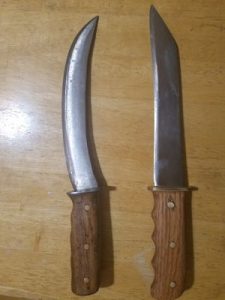The first few knives I made were from railroad spikes that had been recovered during metal detecting. Obviously steel retrieved after being buried in the ground for years will have deteriorated. I selected a few that were the best looking and did not appear to have been buried for 100 years.
I think I threw these in the forge without any cleanup which is a mistake. Take the extra time and use an angle grinder to remove all of the rust and get down to clean metal. This will eliminate a lot of issues and heartache later.
I don’t have many in-progress pictures for these, but I forged them out and folded the spike head in to the billet without forge welding it. I believe I ended up having to weld where the spike head ended up in the billet because of inclusions.
The first knife was a skinner. This is mainly because that is how it forged out. As I drew out the edge it became larger which caused it to curve. I just went with the flow and made the knife that way. The handles I used are sourced from trees I mill on the homestead. Typically they are white oak. The second knife I made was a Sax. I think it is amazing that you can draw out a full tang knife around 11″ long using just one railroad spike.
I am using a 4″ x 36″ stationary sander from Harbor Freight to grind with. I started by using the 40 and 80 grit belts available from Harbor Freight. They will remove stock but it takes a long time.
